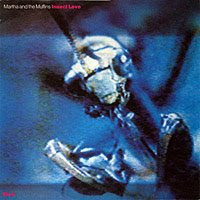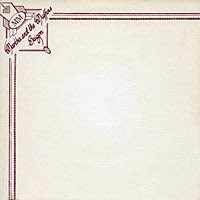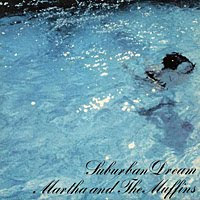
Messengers should have had it all. They had the gear, the talent, and the songs. They were a synth pop duo at the very height of the music-buying public's fascination with guys in buttoned-up shirts and monophonic synthesizers. And they had the unstinting support of the prime mover of all things New Romantic, Midge Ure. Ure signed them to his label, produced their records, and even invited them to tour the world with Ultravox. But not everything works out as it should.
Messengers were formed out of the ashes of Modern Man, a Glaswegian post-punk outfit that Ure discovered playing in a bar on Sauchiehall Street. Ure took an instant liking to the band, and offered to produce their first and only lp, Concrete Scheme (1980). Though it featured some strong songs (Ure would later cover "Wastelands" on his solo debut), the band broke up soon after its release. Drummer Colin King and guitarist Danny Mitchell decided to carry on as a duo, with King taking on the lead vocal duties and Mitchell turning his attention to the synthesizer. Calling themselves The Furious Monkeys, they recorded some demos on a four track tape deck and sent them to their former mentor.
More than a year passed when, out of the blue, Ure asked them if they'd like to support Ultravox on their upcoming Monument tour. Ure also suggested that they should have something to hock while they were getting the chance to play in front of such large audiences. Mitchell and King happily agreed: they signed with Ure's Musicfest label, a subsidiary of Chrysalis, and set about recording their first single. The Furious Monkeys had suddenly become Messengers.
"I Turn In (To You)" (1982) has the full and lush sound that Ure and his compatriots had been developing on albums such as Quartet (1981), and on Ure's own solo single from the period, "No Regrets" (1982). In a recent interview, Mitchell suggests that the similarity was the result of circumstances rather than any effort to consciously emulate Ure:
"I think the similarity of the sounds would be down to sound engineer extraordinaire John Hudson who was Midge’s first choice in those days and Warren Cann’s Linndrum and, of course, Midge’s guiding hand. The other ingredients were a heavily compressed vintage Steinway, a trusty Yamaha string machine and my duophonic Yamaha synth. As for the vocals, they were painstakingly put together almost word by word, much to Colin’s frustration, in a technique that Midge favoured."
"I Turn In (To You)" may indeed sound rather like paint-by-numbers Ultravox, but, to its credit, it is a much more successful attempt to recreate that sound than many bands were able to manage during this period. The vocals, in particular, have that Olympian quality of yearning that few singers can achieve convincingly. And it has a positively sublime middle eight.
Messengers toured the world with Ultravox, taking their place on a towering gantry to the left of the impressive, monochromatic stage set each night. Mitchell added additional keyboard parts, while both he and King sang backing vocals, allowing the band to reproduce the increasingly dense wall of sound that Ultravox had become known for on their albums. On one occasion, while playing in France, King accidentally toppled from their crow's nest and broke his arm. Mitchell picks up the story:
"At the end of the show Midge called out, whilst turning to face our perch, ‘Our special guests Messengers’. With a combined look of confusion, puzzlement and anger he mouthed to me, ‘Where the f**k is Colin?’ Meanwhile, Colin was having his wedding ring surgically removed by bemused French medical staff, who, due to language difficulties, had concluded that he had fallen from a trapeze."
The duo's contribution to Ultravox's live sound during this period is abundantly evident on Monument (1982), the audio record of this tour, and one which has been recently remastered and expanded.
Messengers went on to release two more singles, both produced by Ure. "Great Institutions" (1983) featured a gorgeous Bronzino nude on its Peter Saville-designed cover, and a pair of impressive b sides, including a live track, "Strawboy." "Frontiers" (1984) added a wash of feedback guitar as texture and showed the duo continuing to grow as song writers and arrangers. The b sides offered a tip of the hat to Bowie's influence with a cover of "Andy Warhol."
And that was that. Though the band had enough material for an album, and Ure continued to stand by his Glaswegian mates, Chrysalis wasn't willing to put the money up to record a long player and the duo went their separate ways. Mitchell continued his collaboration with Ure, co-writing one of his best-known singles, "If I Was," but there was little else to be said of Messengers until 2004 when King and Mitchell reunited to record the songs that they had imagined forming their first long player all those years ago, and then releasing it directly through Extreme Voice, the Ultravox fan site. You can purchase a copy here.
Messengers have been unfairly overlooked, even in this remaster and reissue age of ours. Despite their close association with one of the best-known bands of the eighties, there's no Wikipedia page, and the entries at All Music Guide and Discogs are threadbare at best. Listened back to back, however, the three singles and the accompanying b sides gathered here make a persuasive case for the duo's claim to being something more than a footnote in the Ultravox story.
--Crash the Driver
"I Turn In (To You)"
01 I Turn In (To You)
02 The Semi-Professionals (Theme One)
UK 7" Chrysalis [CHS 2663] 1982
"Great Institutions"
03 Great Institutions (MF Mix)
04 Here Come The Heroes
05 Strawboys (Live)
UK 12" Chrysalis [MUST X1] 1983
"Frontiers"
06 Frontiers (Extended Version)
07 The Plains of Siberia
08 Andy Warhol
UK 12" Chrysalis [MUST X2] 1984


 After 1982's stunning True Romance At The Worlds Fair, the wife and husband duo of Lydia Tomkiw (words and music) and Don Hedeker (music and vice) bided their time. Tomkiw frequently booked friends with bands or poetry into clubs, and even co-owned one (Lower Links) for a period. She was not just a poet and band-member, then, but a tireless promoter of the local Chicago scene.
After 1982's stunning True Romance At The Worlds Fair, the wife and husband duo of Lydia Tomkiw (words and music) and Don Hedeker (music and vice) bided their time. Tomkiw frequently booked friends with bands or poetry into clubs, and even co-owned one (Lower Links) for a period. She was not just a poet and band-member, then, but a tireless promoter of the local Chicago scene. 
 It's one of those decisive musical moments. You pick up a record with scarred cover that you found hidden in the back of a large disused collection. It looks completely generic, uninteresting, bland. When you pull out the vinyl it's gouged and barely wants to sit still in the record player. Nervous vinyl. You cue up the first selection with no special anticipation. You've listened to thousands of records like this one, issued from bedrooms and garages all over the North American continent. It's 1982; everyone is doing it.
It's one of those decisive musical moments. You pick up a record with scarred cover that you found hidden in the back of a large disused collection. It looks completely generic, uninteresting, bland. When you pull out the vinyl it's gouged and barely wants to sit still in the record player. Nervous vinyl. You cue up the first selection with no special anticipation. You've listened to thousands of records like this one, issued from bedrooms and garages all over the North American continent. It's 1982; everyone is doing it.













 Insect Love 7"
Insect Love 7" Insect Love 7"
Insect Love 7" Echo Beach 7"
Echo Beach 7" Saigon 7"
Saigon 7" About Insomnia 7"
About Insomnia 7" Suburban Dream 7"
Suburban Dream 7" Was Ezo 7"
Was Ezo 7"







